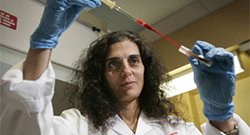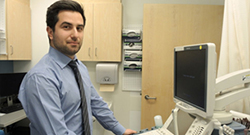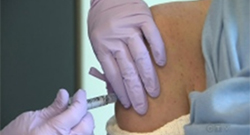 MUHC researchers make discovery about head and neck cancers
MUHC researchers make discovery about head and neck cancers
A group of scientists at the MUHC has led the way in making a promising discovery about head and neck cancers that are linked to alcohol and tobacco use, raising hopes for better and more targeted therapies. The Scientists found that mutations in certain proteins — called histone H3 — are responsible for not only causing head and neck cancers in up to 15 per cent of adults, but those mutations also make the disease harder to treat. Dr. Nada Jabado, a hematologist-oncologist who also works at the Research Institute of the MUHC, spoke with the Montreal Gazette and World News Report about what this means for future cancer patients.

Fewer male physicians under the age of 40 choosing to practice obstetrics and gynecology
The proportion of male medical students opting to specialize in obstetrics and gynecology has decreased over the last 20 years. In Quebec, 16% of gynecologists 40 and under are male. RVH resident, Dr. Mihnea Gangal spoke to the Journal de Montréal and on CJAD's Natasha Hall Show about why he chose to specialize in urogynecology and possible reasons fewer male physicians are choosing to practice gynecology in general.
 Emergency rooms continue to be crowded
Emergency rooms continue to be crowded
Emergency rooms throughout Montreal continue to be crowded, although doctors say the number of patients is normal for this time of year. For the past several weeks the busiest emergency rooms in the city, namely the Lakeshore General and the Jewish General, have been functioning at about 190 per cent of their capacity. The Royal Victoria, St. Mary's, and Verdun have been around 130 to 155 percent capacity over the past two weeks. Meanwhile the number of patients at the Montreal Children's hospital has dropped, going from 92 per cent two weeks ago to 58 per cent on Tuesday morning. For the latest, visit CTV, CBC and TVA.
 Breakthrough in MS treatment
Breakthrough in MS treatment
In separate clinical trials, a drug called ocrelizumab has been shown to reduce new attacks in patients with relapsing remitting multiple sclerosis (MS), and new symptom progression in primary progressive MS. Three studies conducted by an international team of researchers, which included Amit Bar-Or and Douglas Arnold from the Montreal Neurological Institute and Hospital of McGill University, have discovered that ocrelizumab can significantly reduce new attacks in patients with relapsing MS, as well as slow the progression of symptoms caused by primary progressive MS. For the details, visit The Science Explorer.
[view:related_content=block_2]
